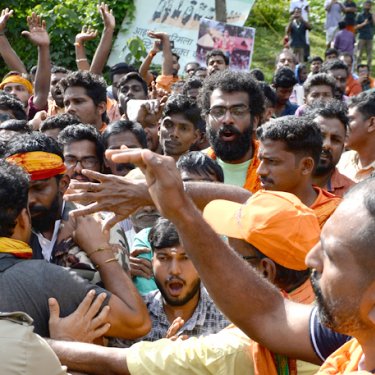Hindu fundamentalists attack women reporters in Southern India

Reporters Without Borders (RSF) condemns the unacceptable physical attacks on reporters covering the start of pilgrimage to a Hindu temple in the southern state of Kerala that was open to women of all ages for the first time yesterday, and calls on the Indian authorities to guarantee the reporters’ safety.
While covering the opening of Sabarimala temple yesterday, dozens of journalists, above all women journalists, were attacked with unprecedented violence by hundreds of Hindu fundamentalist protesters opposed to an Indian supreme court decision to lift a ban on women aged from 10 to 50 from entering the temple. The pilgrimage is due to continue until 22 October.
“We call on the Indian authorities to do everything possible to guarantee the protection of journalists who want to cover this event, especially women journalists,” said Daniel Bastard, the head of RSF’s Asia-Pacific desk.
“This obviously applies to the Kerala state government, which has a duty to protect the journalists by making sufficient police available. But this also applies to the highest levels of the Hindu nationalist movement, starting with ruling party officials and the prime minister, who must condemn this violence in the strongest terms.”
Stones thrown
Republic TV reporter Pooja Prasanna’s car was attacked by an enraged crowd at around midday yesterday in Nilackal, a locality on the pilgrimage route to the temple. Just minutes later, India Today reporter Mausami Singh was dragged from a nearby bus and repeatedly slapped. When she tried to seek refuge in a police car, she was stoned by people chanting religious slogans, witnesses said.
Around the same time, Saritha S. Balan, a reporter for The News Minute website, was dragged from a bus in the locality of Pamba and was badly beaten, including on her spine, while the car of CNN-News 18 reporter Radhika Ramaswamy was destroyed.
New Delhi TV reporter Sneha Koshy and Libi C.S., a reporter for the Kerala news website newsgil.com, were also attacked. A reporter for Reporter TV identified only as Rajeesh sustained an arm fracture, and his cameraman was also injured. Dozens of journalism students, mainly female students, were also harassed while covering the pilgrimage, which draws as many as 20 million people every year.
Forbidden subject
The origin of all this rage was the supreme court decision to lift the centuries-old ban on women aged from 10 to 50 from entering Sabarimala temple, a ban supported by Hindu fundamentalists who believe that the presence of women of menstruating age would upset the temple’s main divinity. Hindu nationalist activists therefore set themselves the goal of preventing women reporters from entering the temple to cover the story.
Journalists who dare to cover subjects related to women’s rights in India are exposed to the possibility of terrible reprisals, even murder. This was the fate of Gauri Lankesh, the editor of the lay and feminist weekly Lankesh Patrike, who was gunned down outside her home just over a year ago.
But this is by no means limited to India, as RSF pointed out in a recent report entitled “Women’s rights: Forbidden subject,” which looked at similar issues in such countries as Iran, Mexico, Somalia, France and the United States. The problem is global.
India is ranked 138th out of 180 countries in RSF’s 2018 World Press Freedom Index.



